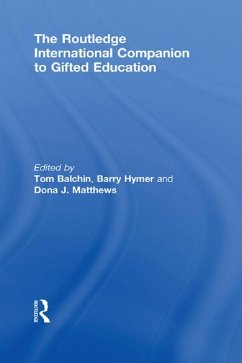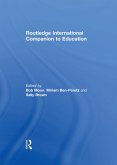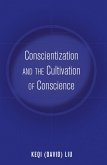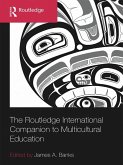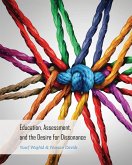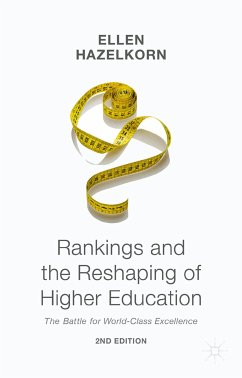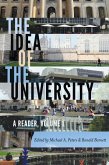The Routledge International Companion to Gifted Education (eBook, PDF)
Redaktion: Balchin, Tom; Matthews, Dona J.; Hymer, Barry
51,95 €
51,95 €
inkl. MwSt.
Sofort per Download lieferbar

26 °P sammeln
51,95 €
Als Download kaufen

51,95 €
inkl. MwSt.
Sofort per Download lieferbar

26 °P sammeln
Jetzt verschenken
Alle Infos zum eBook verschenken
51,95 €
inkl. MwSt.
Sofort per Download lieferbar
Alle Infos zum eBook verschenken

26 °P sammeln
The Routledge International Companion to Gifted Education (eBook, PDF)
Redaktion: Balchin, Tom; Matthews, Dona J.; Hymer, Barry
- Format: PDF
- Merkliste
- Auf die Merkliste
- Bewerten Bewerten
- Teilen
- Produkt teilen
- Produkterinnerung
- Produkterinnerung

Bitte loggen Sie sich zunächst in Ihr Kundenkonto ein oder registrieren Sie sich bei
bücher.de, um das eBook-Abo tolino select nutzen zu können.
Hier können Sie sich einloggen
Hier können Sie sich einloggen
Sie sind bereits eingeloggt. Klicken Sie auf 2. tolino select Abo, um fortzufahren.

Bitte loggen Sie sich zunächst in Ihr Kundenkonto ein oder registrieren Sie sich bei bücher.de, um das eBook-Abo tolino select nutzen zu können.
An authoritative guide to the new ideas and controversies that are likely to form the basis of gifted education discussion and policy-making around the world during the next decade and beyond.
- Geräte: PC
- mit Kopierschutz
- eBook Hilfe
- Größe: 2.91MB
Andere Kunden interessierten sich auch für
![Routledge International Companion to Education (eBook, PDF) Routledge International Companion to Education (eBook, PDF)]() Routledge International Companion to Education (eBook, PDF)272,95 €
Routledge International Companion to Education (eBook, PDF)272,95 €![The Routledge Companion to Dyslexia (eBook, PDF) The Routledge Companion to Dyslexia (eBook, PDF)]() The Routledge Companion to Dyslexia (eBook, PDF)49,95 €
The Routledge Companion to Dyslexia (eBook, PDF)49,95 €- -77%11
![Conscientization and the Cultivation of Conscience (eBook, PDF) Conscientization and the Cultivation of Conscience (eBook, PDF)]() Keqi Liu (David)Conscientization and the Cultivation of Conscience (eBook, PDF)38,95 €
Keqi Liu (David)Conscientization and the Cultivation of Conscience (eBook, PDF)38,95 € ![The Routledge International Companion to Multicultural Education (eBook, PDF) The Routledge International Companion to Multicultural Education (eBook, PDF)]() The Routledge International Companion to Multicultural Education (eBook, PDF)79,95 €
The Routledge International Companion to Multicultural Education (eBook, PDF)79,95 €- -60%11
![Education, Assessment, and the Desire for Dissonance (eBook, PDF) Education, Assessment, and the Desire for Dissonance (eBook, PDF)]() Yusef WaghidEducation, Assessment, and the Desire for Dissonance (eBook, PDF)40,95 €
Yusef WaghidEducation, Assessment, and the Desire for Dissonance (eBook, PDF)40,95 € ![Rankings and the Reshaping of Higher Education (eBook, PDF) Rankings and the Reshaping of Higher Education (eBook, PDF)]() Ellen HazelkornRankings and the Reshaping of Higher Education (eBook, PDF)40,95 €
Ellen HazelkornRankings and the Reshaping of Higher Education (eBook, PDF)40,95 €- -50%11
![The Idea of the University (eBook, PDF) The Idea of the University (eBook, PDF)]() The Idea of the University (eBook, PDF)73,95 €
The Idea of the University (eBook, PDF)73,95 € -
- -17%11
- -14%11
An authoritative guide to the new ideas and controversies that are likely to form the basis of gifted education discussion and policy-making around the world during the next decade and beyond.
Dieser Download kann aus rechtlichen Gründen nur mit Rechnungsadresse in A, B, BG, CY, CZ, D, DK, EW, E, FIN, F, GR, HR, H, IRL, I, LT, L, LR, M, NL, PL, P, R, S, SLO, SK ausgeliefert werden.
Produktdetails
- Produktdetails
- Verlag: Taylor & Francis eBooks
- Seitenzahl: 400
- Erscheinungstermin: 1. Februar 2013
- Englisch
- ISBN-13: 9781136028786
- Artikelnr.: 38264106
- Verlag: Taylor & Francis eBooks
- Seitenzahl: 400
- Erscheinungstermin: 1. Februar 2013
- Englisch
- ISBN-13: 9781136028786
- Artikelnr.: 38264106
- Herstellerkennzeichnung Die Herstellerinformationen sind derzeit nicht verfügbar.
Tom Balchin is a Research Fellow and Lecturer in gifted education, based in the Brunel Able Children's Education Centre at Brunel University, UK. He is also a Visiting Lecturer at the Institute of Education, Reading University, UK. Barry Hymer is a Visiting Fellow at Newcastle University's Centre for Teaching and Learning in the UK. He is a freelance educator, chartered psychologist, trainer and writer, specialising in the fields of thinking skills, creativity and gifted education. Dona Matthews is a Visiting Professor at the Ontario Institute for Studies in Education of the University of Toronto and, until recently, the Director of the Center for Gifted Studies and Education at the Hunter College, City University of New York, working with the New York City Department of Education on gifted education policies and practices.
Part 1: Models, Definitions & Conceptual Challenges 1. Brightening Up: How
Children Learn To Be Gifted Guy Claxton and Sara Meadows 2. Neural
Interconnectivity And Intellectual Creativity: Giftedness, Savants, And
Learning Styles John Geake 3. Making Connections: Cognition, Emotion, And A
Shifting Paradigm Dona J. Matthews and Christy Folsom 4. Giftedness: The
Gift That Keeps On Giving Dean Simonton 5. Talent Development: DMGT
Françoys Gagné 6. The Nature Of Creative Giftedness And Talent Todd Lubart,
Asta Georgsdottir and Maud Besançon 7. The Future Of The English Definition
Of Giftedness Thomas BalchinPart 2: International Perspectives 8. Gifted
Education From The German Perspective KurtHeller 9. Education Practices For
Gifted Learners In France: An Overview Pierre Vrignaud, Denis Bonora, and
Annie Dreux 10. High Ability Education In Sweden: The Swedish Model Åke
Edfeldt and Inger Wistedt 11. A Proposal For Gifted Education In Reluctant
Schools: The Case Of The Greek School System Elias Matsagouras and
Evangelia Dougali 12. We Can Still Do This, Or Can We? The Russian System
Of Educating And Promoting Talent In Mathematics And Science Ida Jeltova,
Konstantin Lukin and Elena L. Grigorenko 13. Russian Strategies For Talent
Development: Stimulating Comfort And Discomfort Victoria S. Yurkevich and
Boris M. Davidovich 14. Gifted But Underachieving: Australian Indigenous
Children Graham M. Chaffey 15. Lay Conceptions Of Giftedness Among The
Chinese People David W. ChanPart 3: Psychosocial Development 16. The Ethics
Of Gifted Education - What Can We Learn From Medical Ethics? Annie Haight
17. Ethical Sensitivity And Giftedness Kirsi Tirri 18. Morality And
Giftedness Joan Freeman 19. Emotional Intelligence: Re-Examining Some
Preconceptions Maria Dolores Prieto and Mercedes Ferrando 20. Too Long
Neglected: Giftedness In Younger Children Valsa Koshy 21. Teaching The Able
Child ... Or Teaching The Child To Be Able? Jan Hughes 22. Global Success
And Giftedness Carmen Cretu 23. A Reconsideration Of The Widely Held
Conviction That Gifted Students Prefer To Work Alone Lisa R. French and
Bruce M. ShorePart 4: Theory into Practice: Differentiation Strategies,
Tools, and Approaches 24. A Computerized Strength Assessment And
Internet-Based Enrichment Program For Developing Giftedness And Talents
Joseph Renzulli and Sally Reis 25. Acceleration: Meeting The Academic And
Social Needs Of Students Nicholas Colangelo and Susan Assouline 26.
Recognising And Fostering Creative Production Thomas Balchin 27.
Programming For Talent Development: Expanding Horizons For Gifted Education
Donald Treffinger, Carole A. Nassab and Edwin C. Selby 28. Special
Educational Needs And Dual Exceptionality Diane Montgomery 29. Visual
Thinking: A Gifted Boy With Asperger Syndrome Wieslawa Limont 30. Challenge
And Creativity: Making The Links Helen Wilson 31. Educating For Enquiry:
Personalising Learning Through Dialogic Teaching Robert FisherPart 5:
Expanding Horizons: Supporting Gifted Development More Broadly 32. Wisdom,
Intelligence, Creativity, Synthesised: A Model Of Giftedness Robert
Sternberg 33. Fostering Giftedness In Urban And Diverse Communities:
Context-Sensitive Solutions Ian Warwick and Dona Matthews 34. The Role Of
Gifted Education In Promoting Cultural Diversity Joyce VanTassel-Baska 35.
Developing Pupils' Problem-Solving And Thinking Skills Belle Wallace 36.
Creating Inclusive And Inclusional Understandings Of Gifts And Talents
Through Living Educational Theory Research Marie Huxtable 37. Beyond
Compare? Thoughts Towards An Inclusional, Fluid, And Non-Normative
Understanding Of Giftedness Barry J. Hymer 38. Self-Theories And Lessons
For Giftedness: A Reflective Conversation Carol S. Dweck 39. Turning Points
And Future Directions In Gifted Education And Talent Development Sally M.
Reis
Children Learn To Be Gifted Guy Claxton and Sara Meadows 2. Neural
Interconnectivity And Intellectual Creativity: Giftedness, Savants, And
Learning Styles John Geake 3. Making Connections: Cognition, Emotion, And A
Shifting Paradigm Dona J. Matthews and Christy Folsom 4. Giftedness: The
Gift That Keeps On Giving Dean Simonton 5. Talent Development: DMGT
Françoys Gagné 6. The Nature Of Creative Giftedness And Talent Todd Lubart,
Asta Georgsdottir and Maud Besançon 7. The Future Of The English Definition
Of Giftedness Thomas BalchinPart 2: International Perspectives 8. Gifted
Education From The German Perspective KurtHeller 9. Education Practices For
Gifted Learners In France: An Overview Pierre Vrignaud, Denis Bonora, and
Annie Dreux 10. High Ability Education In Sweden: The Swedish Model Åke
Edfeldt and Inger Wistedt 11. A Proposal For Gifted Education In Reluctant
Schools: The Case Of The Greek School System Elias Matsagouras and
Evangelia Dougali 12. We Can Still Do This, Or Can We? The Russian System
Of Educating And Promoting Talent In Mathematics And Science Ida Jeltova,
Konstantin Lukin and Elena L. Grigorenko 13. Russian Strategies For Talent
Development: Stimulating Comfort And Discomfort Victoria S. Yurkevich and
Boris M. Davidovich 14. Gifted But Underachieving: Australian Indigenous
Children Graham M. Chaffey 15. Lay Conceptions Of Giftedness Among The
Chinese People David W. ChanPart 3: Psychosocial Development 16. The Ethics
Of Gifted Education - What Can We Learn From Medical Ethics? Annie Haight
17. Ethical Sensitivity And Giftedness Kirsi Tirri 18. Morality And
Giftedness Joan Freeman 19. Emotional Intelligence: Re-Examining Some
Preconceptions Maria Dolores Prieto and Mercedes Ferrando 20. Too Long
Neglected: Giftedness In Younger Children Valsa Koshy 21. Teaching The Able
Child ... Or Teaching The Child To Be Able? Jan Hughes 22. Global Success
And Giftedness Carmen Cretu 23. A Reconsideration Of The Widely Held
Conviction That Gifted Students Prefer To Work Alone Lisa R. French and
Bruce M. ShorePart 4: Theory into Practice: Differentiation Strategies,
Tools, and Approaches 24. A Computerized Strength Assessment And
Internet-Based Enrichment Program For Developing Giftedness And Talents
Joseph Renzulli and Sally Reis 25. Acceleration: Meeting The Academic And
Social Needs Of Students Nicholas Colangelo and Susan Assouline 26.
Recognising And Fostering Creative Production Thomas Balchin 27.
Programming For Talent Development: Expanding Horizons For Gifted Education
Donald Treffinger, Carole A. Nassab and Edwin C. Selby 28. Special
Educational Needs And Dual Exceptionality Diane Montgomery 29. Visual
Thinking: A Gifted Boy With Asperger Syndrome Wieslawa Limont 30. Challenge
And Creativity: Making The Links Helen Wilson 31. Educating For Enquiry:
Personalising Learning Through Dialogic Teaching Robert FisherPart 5:
Expanding Horizons: Supporting Gifted Development More Broadly 32. Wisdom,
Intelligence, Creativity, Synthesised: A Model Of Giftedness Robert
Sternberg 33. Fostering Giftedness In Urban And Diverse Communities:
Context-Sensitive Solutions Ian Warwick and Dona Matthews 34. The Role Of
Gifted Education In Promoting Cultural Diversity Joyce VanTassel-Baska 35.
Developing Pupils' Problem-Solving And Thinking Skills Belle Wallace 36.
Creating Inclusive And Inclusional Understandings Of Gifts And Talents
Through Living Educational Theory Research Marie Huxtable 37. Beyond
Compare? Thoughts Towards An Inclusional, Fluid, And Non-Normative
Understanding Of Giftedness Barry J. Hymer 38. Self-Theories And Lessons
For Giftedness: A Reflective Conversation Carol S. Dweck 39. Turning Points
And Future Directions In Gifted Education And Talent Development Sally M.
Reis
Part 1: Models, Definitions & Conceptual Challenges 1. Brightening Up: How
Children Learn To Be Gifted Guy Claxton and Sara Meadows 2. Neural
Interconnectivity And Intellectual Creativity: Giftedness, Savants, And
Learning Styles John Geake 3. Making Connections: Cognition, Emotion, And A
Shifting Paradigm Dona J. Matthews and Christy Folsom 4. Giftedness: The
Gift That Keeps On Giving Dean Simonton 5. Talent Development: DMGT
Françoys Gagné 6. The Nature Of Creative Giftedness And Talent Todd Lubart,
Asta Georgsdottir and Maud Besançon 7. The Future Of The English Definition
Of Giftedness Thomas BalchinPart 2: International Perspectives 8. Gifted
Education From The German Perspective KurtHeller 9. Education Practices For
Gifted Learners In France: An Overview Pierre Vrignaud, Denis Bonora, and
Annie Dreux 10. High Ability Education In Sweden: The Swedish Model Åke
Edfeldt and Inger Wistedt 11. A Proposal For Gifted Education In Reluctant
Schools: The Case Of The Greek School System Elias Matsagouras and
Evangelia Dougali 12. We Can Still Do This, Or Can We? The Russian System
Of Educating And Promoting Talent In Mathematics And Science Ida Jeltova,
Konstantin Lukin and Elena L. Grigorenko 13. Russian Strategies For Talent
Development: Stimulating Comfort And Discomfort Victoria S. Yurkevich and
Boris M. Davidovich 14. Gifted But Underachieving: Australian Indigenous
Children Graham M. Chaffey 15. Lay Conceptions Of Giftedness Among The
Chinese People David W. ChanPart 3: Psychosocial Development 16. The Ethics
Of Gifted Education - What Can We Learn From Medical Ethics? Annie Haight
17. Ethical Sensitivity And Giftedness Kirsi Tirri 18. Morality And
Giftedness Joan Freeman 19. Emotional Intelligence: Re-Examining Some
Preconceptions Maria Dolores Prieto and Mercedes Ferrando 20. Too Long
Neglected: Giftedness In Younger Children Valsa Koshy 21. Teaching The Able
Child ... Or Teaching The Child To Be Able? Jan Hughes 22. Global Success
And Giftedness Carmen Cretu 23. A Reconsideration Of The Widely Held
Conviction That Gifted Students Prefer To Work Alone Lisa R. French and
Bruce M. ShorePart 4: Theory into Practice: Differentiation Strategies,
Tools, and Approaches 24. A Computerized Strength Assessment And
Internet-Based Enrichment Program For Developing Giftedness And Talents
Joseph Renzulli and Sally Reis 25. Acceleration: Meeting The Academic And
Social Needs Of Students Nicholas Colangelo and Susan Assouline 26.
Recognising And Fostering Creative Production Thomas Balchin 27.
Programming For Talent Development: Expanding Horizons For Gifted Education
Donald Treffinger, Carole A. Nassab and Edwin C. Selby 28. Special
Educational Needs And Dual Exceptionality Diane Montgomery 29. Visual
Thinking: A Gifted Boy With Asperger Syndrome Wieslawa Limont 30. Challenge
And Creativity: Making The Links Helen Wilson 31. Educating For Enquiry:
Personalising Learning Through Dialogic Teaching Robert FisherPart 5:
Expanding Horizons: Supporting Gifted Development More Broadly 32. Wisdom,
Intelligence, Creativity, Synthesised: A Model Of Giftedness Robert
Sternberg 33. Fostering Giftedness In Urban And Diverse Communities:
Context-Sensitive Solutions Ian Warwick and Dona Matthews 34. The Role Of
Gifted Education In Promoting Cultural Diversity Joyce VanTassel-Baska 35.
Developing Pupils' Problem-Solving And Thinking Skills Belle Wallace 36.
Creating Inclusive And Inclusional Understandings Of Gifts And Talents
Through Living Educational Theory Research Marie Huxtable 37. Beyond
Compare? Thoughts Towards An Inclusional, Fluid, And Non-Normative
Understanding Of Giftedness Barry J. Hymer 38. Self-Theories And Lessons
For Giftedness: A Reflective Conversation Carol S. Dweck 39. Turning Points
And Future Directions In Gifted Education And Talent Development Sally M.
Reis
Children Learn To Be Gifted Guy Claxton and Sara Meadows 2. Neural
Interconnectivity And Intellectual Creativity: Giftedness, Savants, And
Learning Styles John Geake 3. Making Connections: Cognition, Emotion, And A
Shifting Paradigm Dona J. Matthews and Christy Folsom 4. Giftedness: The
Gift That Keeps On Giving Dean Simonton 5. Talent Development: DMGT
Françoys Gagné 6. The Nature Of Creative Giftedness And Talent Todd Lubart,
Asta Georgsdottir and Maud Besançon 7. The Future Of The English Definition
Of Giftedness Thomas BalchinPart 2: International Perspectives 8. Gifted
Education From The German Perspective KurtHeller 9. Education Practices For
Gifted Learners In France: An Overview Pierre Vrignaud, Denis Bonora, and
Annie Dreux 10. High Ability Education In Sweden: The Swedish Model Åke
Edfeldt and Inger Wistedt 11. A Proposal For Gifted Education In Reluctant
Schools: The Case Of The Greek School System Elias Matsagouras and
Evangelia Dougali 12. We Can Still Do This, Or Can We? The Russian System
Of Educating And Promoting Talent In Mathematics And Science Ida Jeltova,
Konstantin Lukin and Elena L. Grigorenko 13. Russian Strategies For Talent
Development: Stimulating Comfort And Discomfort Victoria S. Yurkevich and
Boris M. Davidovich 14. Gifted But Underachieving: Australian Indigenous
Children Graham M. Chaffey 15. Lay Conceptions Of Giftedness Among The
Chinese People David W. ChanPart 3: Psychosocial Development 16. The Ethics
Of Gifted Education - What Can We Learn From Medical Ethics? Annie Haight
17. Ethical Sensitivity And Giftedness Kirsi Tirri 18. Morality And
Giftedness Joan Freeman 19. Emotional Intelligence: Re-Examining Some
Preconceptions Maria Dolores Prieto and Mercedes Ferrando 20. Too Long
Neglected: Giftedness In Younger Children Valsa Koshy 21. Teaching The Able
Child ... Or Teaching The Child To Be Able? Jan Hughes 22. Global Success
And Giftedness Carmen Cretu 23. A Reconsideration Of The Widely Held
Conviction That Gifted Students Prefer To Work Alone Lisa R. French and
Bruce M. ShorePart 4: Theory into Practice: Differentiation Strategies,
Tools, and Approaches 24. A Computerized Strength Assessment And
Internet-Based Enrichment Program For Developing Giftedness And Talents
Joseph Renzulli and Sally Reis 25. Acceleration: Meeting The Academic And
Social Needs Of Students Nicholas Colangelo and Susan Assouline 26.
Recognising And Fostering Creative Production Thomas Balchin 27.
Programming For Talent Development: Expanding Horizons For Gifted Education
Donald Treffinger, Carole A. Nassab and Edwin C. Selby 28. Special
Educational Needs And Dual Exceptionality Diane Montgomery 29. Visual
Thinking: A Gifted Boy With Asperger Syndrome Wieslawa Limont 30. Challenge
And Creativity: Making The Links Helen Wilson 31. Educating For Enquiry:
Personalising Learning Through Dialogic Teaching Robert FisherPart 5:
Expanding Horizons: Supporting Gifted Development More Broadly 32. Wisdom,
Intelligence, Creativity, Synthesised: A Model Of Giftedness Robert
Sternberg 33. Fostering Giftedness In Urban And Diverse Communities:
Context-Sensitive Solutions Ian Warwick and Dona Matthews 34. The Role Of
Gifted Education In Promoting Cultural Diversity Joyce VanTassel-Baska 35.
Developing Pupils' Problem-Solving And Thinking Skills Belle Wallace 36.
Creating Inclusive And Inclusional Understandings Of Gifts And Talents
Through Living Educational Theory Research Marie Huxtable 37. Beyond
Compare? Thoughts Towards An Inclusional, Fluid, And Non-Normative
Understanding Of Giftedness Barry J. Hymer 38. Self-Theories And Lessons
For Giftedness: A Reflective Conversation Carol S. Dweck 39. Turning Points
And Future Directions In Gifted Education And Talent Development Sally M.
Reis
